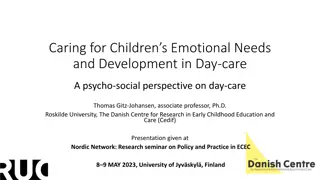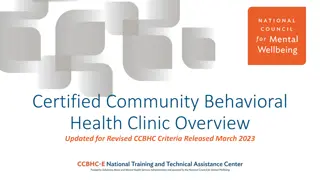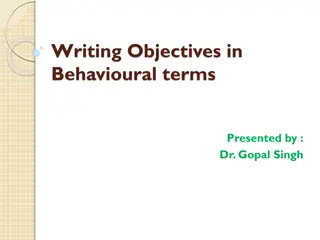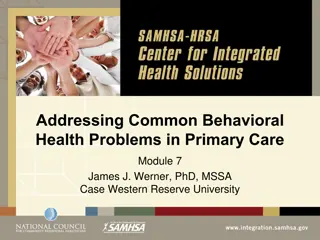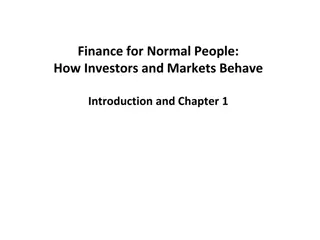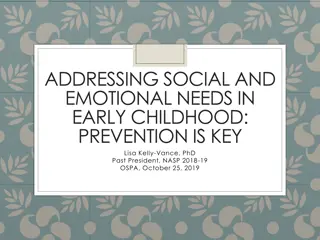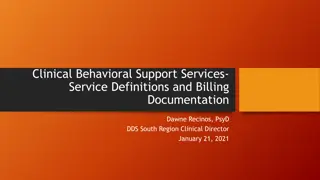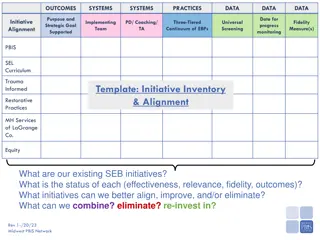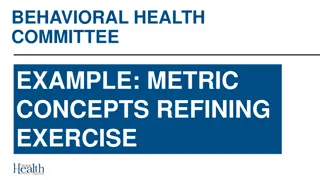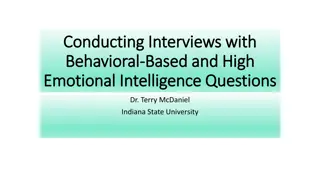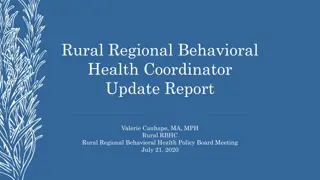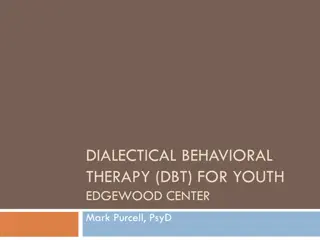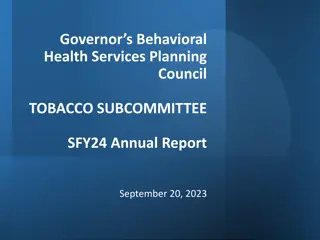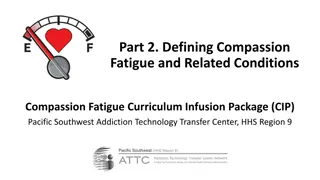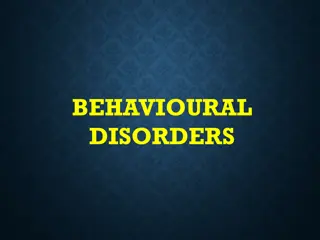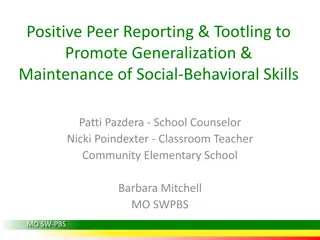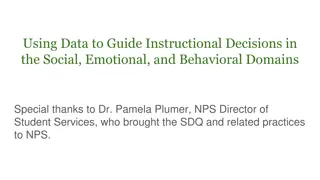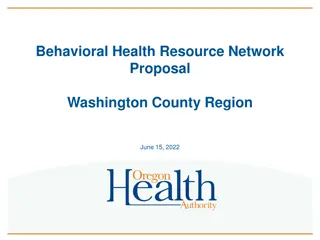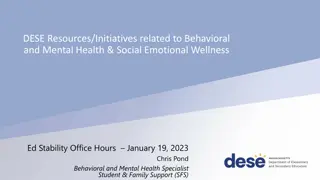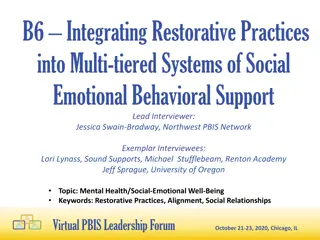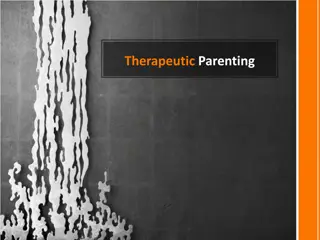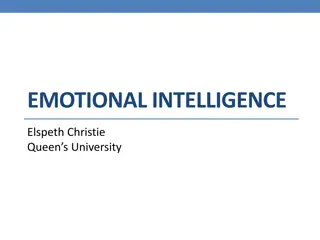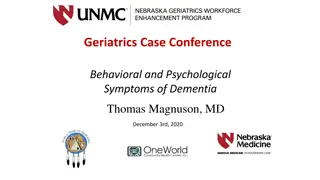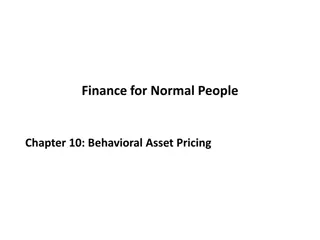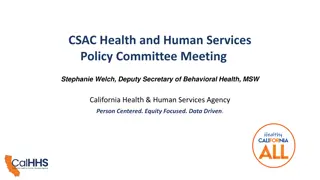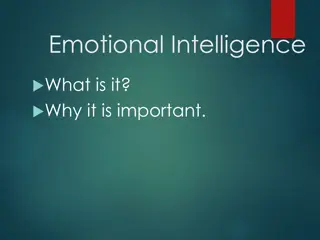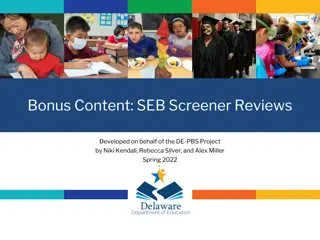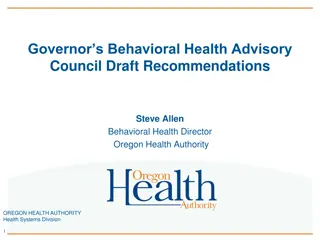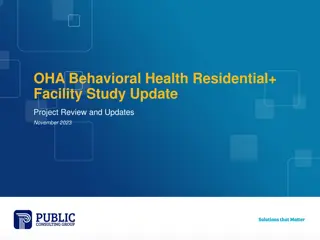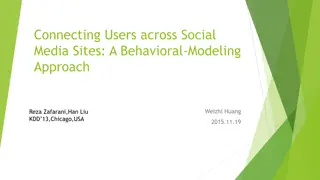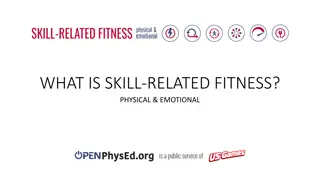Understanding Children's Emotional Development in Daycare from a Psycho-Social Perspective
Scientific evidence emphasizes the early onset of emotional development and its profound impact on lifelong outcomes. The quality of childcare processes plays a pivotal role in shaping children's social-emotional development, highlighting the importance of nurturing emotional relationships in daycar
0 views • 10 slides
Overview of Certified Community Behavioral Health Clinic (CCBHC) Model
The Certified Community Behavioral Health Clinic (CCBHC) model aims to enhance service quality and accessibility by offering integrated, evidence-based, person- and family-centered care. CCBHCs provide a full range of mental health, substance use, and primary care services while emphasizing care coo
0 views • 21 slides
Enhancing School Success Through Social and Emotional Learning (SEL)
Understanding the crucial role of Social and Emotional Learning (SEL) in promoting children's ethical development is key to improving academic achievement, fostering positive school climate, and reducing behavioral issues. Research underscores how SEL positively impacts students' overall well-being,
1 views • 16 slides
Understanding Behavioral Objectives in Education
Behavioral objectives in education are essential for effective teaching and learning. They provide clear direction on what students will achieve and how teachers can facilitate that learning. Different types of objectives, such as general and specific objectives, help in structuring educational goal
2 views • 13 slides
Behavioral Health in Primary Care: Understanding and Addressing Common Problems
Patients visiting primary care often present with physical symptoms that lack clear biological causes, indicating the importance of considering behavioral factors. Up to 70% of primary care visits are related to behavioral health needs, stressing the significance of addressing unhealthy lifestyle be
0 views • 40 slides
Understanding Behavioral Finance in "Finance for Normal People
Delve into the world of behavioral finance as presented in "Finance for Normal People," exploring how investors and markets behave based on cognitive and emotional factors. The book covers topics such as cognitive shortcuts and errors, emotional biases, and correcting investment mistakes. It also di
0 views • 20 slides
Understanding Emotional Intelligence: Key Principles and Skills
Emotional intelligence, as presented by David Taylor, is crucial in perceiving, understanding, and managing emotions in oneself and others. It plays a vital role in professional and personal relationships by enhancing emotional awareness, recognition, and management. The principles of emotional inte
1 views • 22 slides
Understanding Social and Emotional Needs in Early Childhood
The early years from birth to age 8 are crucial for developing intellectual, social, and emotional skills that set the foundation for success in school and life. Educating parents about children's emotional capabilities, supporting caregivers, and intervening early can significantly impact children'
1 views • 31 slides
Clinical Behavioral Support Services: Definitions and Guidelines
Clinical Behavioral Support Services are therapeutic interventions aimed at enhancing individuals' independence and community inclusion. These services involve creating positive behavioral support plans, assessing behavioral needs, providing appropriate training, evaluating plan effectiveness, and e
0 views • 11 slides
Evaluation and Alignment of Social-Emotional Behavioral Support Initiatives
Conduct an audit of existing social-emotional behavioral support initiatives to assess effectiveness, relevance, fidelity, and outcomes. Identify areas for better alignment, improvement, or elimination, and explore opportunities for combining, eliminating, or reinvesting in initiatives. Utilize a te
0 views • 2 slides
Refining Metric Concepts for Behavioral Health Committee
This example explores the refinement of metric concepts for a behavioral health committee focusing on improving outcomes related to diverting individuals with behavioral health needs from arrest or incarceration. It delves into two key concepts: availability of drop-off locations and walk-in service
1 views • 6 slides
Enhancing Emotional Intelligence Through Behavioral Interview Questions
Explore the key aspects of emotional intelligence, including social-emotional competencies and cognitive, affective, and behavioral competencies. Learn how to conduct interviews focused on emotional intelligence and discover the importance of relationships, self-awareness, responsible decision-makin
0 views • 44 slides
Rural Regional Behavioral Health Coordinator Update Report
Valerie Cauhape, MA, MPH, presents updates from the Rural Regional Behavioral Health Policy Board Meeting on July 21, 2020. The report highlights increased demand for behavioral health services, challenges in accessing inpatient providers, and initiatives for Behavioral Health Task Force implementat
1 views • 16 slides
Understanding Dialectical Behavioral Therapy (DBT) for Youth
Explore the comprehensive practice of Dialectical Behavioral Therapy (DBT) aimed at enhancing emotional regulation in youth. Learn about different types of emotions, DBT goals, radical acceptance, program overview, dialectics, biosocial theory, and emotional dysregulation. Discover the tools and ski
0 views • 74 slides
Governor's Behavioral Health Services Planning Council Tobacco Subcommittee Report
Tobacco remains a significant risk factor for individuals with behavioral health conditions, with high smoking rates among this population. The Governor's Behavioral Health Services Planning Council Tobacco Subcommittee aims to promote a tobacco-free lifestyle and enhance recovery by addressing toba
0 views • 17 slides
Understanding Compassion Fatigue and Occupational Hazards in Behavioral Health Workforce
Preparation in the behavioral health field involves equipping oneself with the necessary knowledge and skills to address occupational hazards like compassion fatigue. This condition arises from the emotional demands of the job, leading to vicarious traumatization, secondary traumatic stress, and com
0 views • 14 slides
Understanding Behavioral Disorders in Children
Behavioral disorders in children can result from various factors like emotional, physical, and social deprivation. These disorders manifest through a range of behaviors such as temper tantrums, bed-wetting, and aggressiveness. Identifying the causes and types of behavioral disorders is essential for
0 views • 49 slides
Social-Behavioral Skill Enhancement Strategies in Education
Methods like Positive Peer Reporting (PPR) and Tootling are discussed to improve social interactions and alter the social status of students facing challenges in social, emotional, and behavioral aspects. Strategies aim to promote positive behaviors, enhance peer relationships, and create a conduciv
0 views • 25 slides
Using Data for Instructional Decisions in Social, Emotional, and Behavioral Domains
Advocate the use of data-driven strategies like the Strengths and Difficulties Questionnaire (SDQ) to inform instructional decisions in social, emotional, and behavioral domains. The process involves analyzing student data, conducting meetings to review results, and creating intervention strategies
0 views • 7 slides
Behavioral Health Resource Network Proposal - Washington County Region Analysis
This proposal outlines the Behavioral Health Resource Network in Washington County Region, focusing on essential services provided by various organizations to address behavioral health needs, substance use disorders, housing, employment mentoring, and other support services. It highlights budget all
0 views • 8 slides
Understanding Behavioral Finance and Technical Analysis
Behavioral finance explores irrational behaviors in decision-making processes in finance, highlighting the limitations of rationality assumptions. It delves into information processing problems and behavioral biases that can distort market prices. The consistency between technical analysis and behav
0 views • 43 slides
Strategies for Enhancing Behavioral and Mental Health in Educational Settings
This resource highlights key initiatives, major themes, and grant funding opportunities related to behavioral and mental health, emphasizing the importance of supporting students' social-emotional well-being. It addresses the increased need for services post-pandemic and advocates for comprehensive
0 views • 9 slides
Pathways to Excellence Behavioral Health Steering Committee Meeting Overview
The Pathways to Excellence (PTE) Behavioral Health Steering Committee Meeting held on February 17, 2015, reviewed the roles of various organizations, discussed the steering committee membership, and established domains of quality in behavioral health. The meeting focused on reporting meaningful beha
0 views • 16 slides
Behavioral Health Alliance of Montana: Advocating for Behavioral Health Providers and Clients
Formed in 2017 by the Montana Healthcare Foundation, the Behavioral Health Alliance of Montana serves as a unified voice for advocacy on behalf of behavioral health providers and clients in the Central Service Area Authority. With a focus on supporting adult and children's mental health, substance u
0 views • 18 slides
Integrating Restorative Practices into Multi-tiered Systems of Social Emotional Behavioral Support
Explore the integration of restorative practices into multi-tiered systems of social emotional behavioral support in the context of mental health and social-emotional well-being. Gain insights from experts on aligning restorative practices, fostering social relationships, and enhancing virtual PBIS
0 views • 37 slides
Understanding Therapeutic Parenting for Children with Trauma and Attachment Disruption
Therapeutic parenting is a child-centered approach tailored to address the complex emotional and behavioral needs of kinship, adopted, or permanent care children who have experienced attachment disruption and trauma. It focuses on nurturing, empathy, and building trust while refraining from conventi
0 views • 13 slides
Understanding Emotional Intelligence and its Components
Emotional Intelligence is about identifying, understanding, and managing emotions, recognizing your own needs and those of others, and enhancing interpersonal skills. It involves self-perception, self-expression, and affects decision-making and stress management. People with high emotional intellige
0 views • 20 slides
Integrated Behavioral Health Initiative for PHN Practices
The Behavioral Health Initiative (BHI) aims to develop a comprehensive strategy to address mental and behavioral health needs in the PHN regional practice network. It offers training, education, and partnership opportunities for PHN members, including free webinars, office hours, and a yearlong Qual
0 views • 4 slides
Understanding Behavioral Symptoms of Dementia in Geriatric Patients
This informational content discusses the various behavioral and psychological symptoms of dementia (BPSD) in geriatric patients, including common symptoms like depression, aggression, anxiety, and apathy. It highlights the prevalence of behavioral issues in dementia patients, their impact on caregiv
0 views • 15 slides
Understanding Behavioral Asset Pricing: Factors Influencing Price and Return Expectations
Behavioral asset pricing models link investment asset returns with various factors such as risk, liquidity, and cognitive biases. This chapter delves into how features and characteristics influence the pricing of assets like cars and stocks, exploring the utilitarian, expressive, and emotional benef
0 views • 46 slides
Transforming California's Behavioral Health Care System for Comprehensive Support
California's Health and Human Services Agency is dedicated to transforming the behavioral health care system to ensure all Californians have access to high-quality care. This transformative effort includes addressing capacity challenges, enhancing crisis services, providing more community-based opti
0 views • 19 slides
Understanding Emotional Labour in Probation Practice
Explore the concept of emotional labour in probation practice, highlighting the management of emotions, impact on research and practice, links to burnout, and the role of managerialism and rationality. Delve into emotional work, Chamberlayne's 'emotion work', and feeling rules associated with emotio
0 views • 16 slides
Importance of Emotional Intelligence in Religious Leadership
Religious leaders benefit greatly from high emotional intelligence, leading to better performance, increased staff retention, and a more positive work environment. Emotional intelligence plays a vital role in pastoral ministry, enhancing emotional care for congregants. Educational programs focusing
0 views • 15 slides
Understanding Emotional Intelligence: Definition, Importance, and Examples
Emotional intelligence, a term that originated in the 1960s, refers to the ability to recognize and manage emotions in oneself and others effectively. It involves identifying emotions, understanding their impact, and using this awareness to guide behavior. Emotional intelligence is crucial for perso
0 views • 35 slides
SEB Screener Reviews for Delaware Educators
SEB Screener Reviews were developed for the DE-PBS Project in Spring 2022 to support Delaware educators in building knowledge and skills in Positive Behavior Support (PBS). The project aims to create safe and caring learning environments that promote social-emotional and academic development. The sc
0 views • 56 slides
Social-Emotional Health and Resilience of Teachers in East European Countries
This study explores the social-emotional health and resilience of teachers in Latvia, Lithuania, and the Slovak Republic as part of an Erasmus+ project aimed at developing a digital support system to promote their well-being. The interplay between mental health, social-emotional health, and resilien
0 views • 30 slides
Oregon Health Authority's Behavioral Health Advisory Council Recommendations
Oregon Health Authority's Behavioral Health Advisory Council (GBHAC) is focused on improving access to effective behavioral health services for adults and transitional-aged youth with mental illness and substance use disorders. The council's recommendations aim to advance health equity, early detect
0 views • 17 slides
Oregon Behavioral Health Facility Study Update Project Review November 2023
Oregon Health Authority (OHA) is leading a study to evaluate behavioral health facility capacity in Oregon. PCG is conducting the Behavioral Health Residential Facility Study to assess capacity and unmet needs in various facility types. The study involves data collection, community engagement, recom
0 views • 8 slides
Behavioral Modeling Approach Across Social Media Sites
This paper explores a behavioral modeling approach for connecting users across social media sites, aiming to identify individuals based on their shared information and unique behavioral patterns. It addresses the importance of verifying ages online and presents a methodology called MOBIUS for user i
0 views • 29 slides
Understanding Skill-Related Fitness: Physical and Emotional Aspects
Skill-related fitness encompasses both physical and emotional components, such as agility, balance, coordination, power, reaction time, and speed. Physical agility involves quick body movements, while emotional agility relates to positive responses in various situations. Physical balance requires we
0 views • 7 slides
